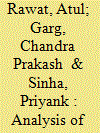| Srl | Item |
| 1 |
ID:
192705


|
|
|
|
|
| Summary/Abstract |
The environmental impact of the transport sector has a significant contribution in the carbon emissions. To reduce fossil fuel consumption and promote clean fuel, many countries are considering hydrogen as an alternative fuel and a bridge to sustainable development and achieve net zero target. Indian government has taken multiple policy initiatives to promote hydrogen fuel adoption in India. But nevertheless, the major presence of the multiple barriers limits the mass adoption of hydrogen as a preferred fuel. Therefore, identification and assessment of the key internal and external barriers of the hydrogen fuel vehicles adoption is required to mitigate the climate change issues. This study has identified and analyzed the barriers. The criticality assessment of the barriers is done by fuzzy based hybrid approach analytic hierarchy process. Later, sensitivity experiments are conducted to verify the robustness of the model. The findings of the study show that technical barriers are most critical barriers in the adoption of hydrogen fuel vehicles in India. The result of the study also indicates that India would require to build the hydrogen supply network and infrastructure, improve consumer awareness, favourable policies and develop efficient production technology for the mass adoption of hydrogen as a fuel.
|
|
|
|
|
|
|
|
|
|
|
|
|
|
|
|
| 2 |
ID:
175891


|
|
|
|
|
| Summary/Abstract |
To strengthen the security of supply of the Serbian gas sector, it is necessary to analyze the impact of planned strategic measures. The analysis involves the identification of the most influential threats to the security of natural gas supply and prioritization of the strategic measures for overcoming the consequences of threats. The proposed methodology is based on Fuzzy Analytic Hierarchy Process. The obtained weights for the identified threats and strategic measures are formed according to experts' judgments. The results of the experts’ judgments indicate that the most influential threats are termination of supply at the border with Hungary, termination of supply from Russia, and termination of supply from gas storage. The strategic measure with the highest priority is the so-called “Turkish Stream” project. Two additional strategic measures (gas interconnection Serbia – Bulgaria and the project of expanding the capacities of underground gas storage) could also be beneficial. The final results are validated by two security of supply indicators - Infrastructural Supply Standard (N-1) and Herfindahl-Hirschman Index (HHI). The N-1 is implemented to examine the preparedness of the gas system for disruption of the largest source in the network, while the HHI is implemented to examine the diversification of the imports.
|
|
|
|
|
|
|
|
|
|
|
|
|
|
|
|